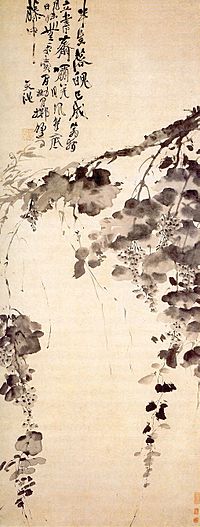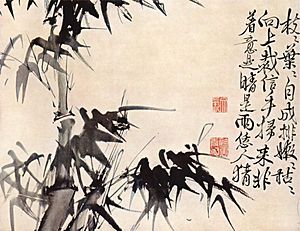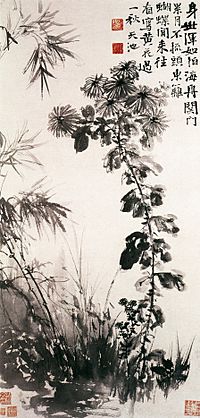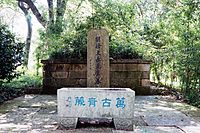Xu Wei facts for kids
Quick facts for kids
Xu Wei
|
|
|---|---|
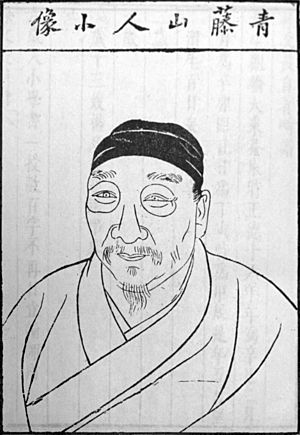
Xu Wei, woodcut print from 1600
|
|
| Born | 1521 |
| Died | 1593 |
| Occupation | Painter, poet, playwright, calligrapher |
| Spouse(s) | Pan Si |
| Children | Xu Mei, Xu Du |
| Parent(s) | |
Xu Wei (Chinese: 徐渭; pinyin: Xú Wèi; Wade–Giles: Hsü Wei, 1521–1593), other department Qingteng Shanren (Chinese: 青藤山人; pinyin: Qīngténg Shānrén), was a Chinese painter, playwright, poet, and tea master during the Ming dynasty. A noted painter, poet, writer and dramatist famed for his artistic expressiveness. Revolutionary for its time, his painting style influenced and inspired countless subsequent painters, such as Bada Shanren, the Eight Eccentrics of Yangzhou, and the modern masters Wu Changshuo and Qi Baishi. Qi once exclaimed in a poem that "How I wish to be born 300 years earlier so I could grind ink and prepare paper for Green Vine ( A Xu Wei pen name)" (恨不生三百年前,為青藤磨墨理紙). Xu Wei can be considered as the founder of modern painting in China. His influence continues to exert itself.
Life
Xu's courtesy names were Wenqing (文清) and then later Wenchang (文長). His pseudonyms were "The Mountain-man of the Heavenly Pond" (天池山人 Tiānchí Shānrén), "Daoist of the Green Vine House" (青藤道士 Qīngténg Dàoshì) and "The Water and Moon of the Bureau's Farm" (署田水月 Shǔtián Shuǐ Yuè). Born in Shanyin (modern Shaoxing, Zhejiang), Xu was raised by a single mother who died when he was 14. At 21, he married a woman surnamed Pan (潘氏), who died five years later. Though he passed the county civil examination at age 20, Xu was never able to pass the provincial civil service examinations, even after attempting it eight times. Nevertheless, Xu was employed by Hu Zongxian, Supreme Commander of the Jiangsu-Zhejiang-Fujian coastal defense against the wokou pirates.
After General Hu was arrested and lost his position, Xu Wei feared a similar fate for himself. Xu became mentally distraught and killed his second wife Zhang (張氏). As a punishment for this murder, he was jailed for seven years until his friend Zhang Yuanbian (張元忭) from the Hanlin Academy managed to free him at age of 53. It is possible Xu Wei suffered from bipolar disorder, a condition actually recognized in China at this time. Xu spent the rest of his life painting, but with little financial success. However, his paintings have been highly sought after in modern times.
Literary career
Xu was a playwright as well. He produced the works Singing in Place of Screaming (simplified Chinese: 歌代啸; traditional Chinese: 歌代嘯; pinyin: gē dài xiào), as well as the treatise on southern drama Nanci Xulu (simplified Chinese: 南词叙录; traditional Chinese: 南詞敘錄; pinyin: Náncí Xùlù). His most well-known dramatic work is a four play cycle known as Four Cries of a Gibbon (simplified Chinese: 四声猿; traditional Chinese: 四聲猿; pinyin: Sì Shēng Yuán). This cycle consists of the following four plays:
- The Mad Drummer Plays The Yuyang Triple Rolls (Mi Heng) (simplified Chinese: 狂鼓史渔阳三弄; traditional Chinese: 狂鼓史漁陽三弄; pinyin: Kuáng gǔ shǐ yú yángsān nòng) - describes the crimes of Cao Cao
- Zen Master Yu Has a Dream of CuiXiang (simplified Chinese: 玉禅师翠乡一梦; traditional Chinese: 玉禅師翠鄉一夢; pinyin: Yù chánshī cuì xiāng yī mèng) - a Buddhist story
- The Female Mulan Joins the Army in Place of Her Father (simplified Chinese: 雌木兰替父从军; traditional Chinese: 雌木蘭替父從軍; pinyin: Cí mùlán tì fù cóngjūn) - describes Hua Mulan
- The Girl Graduate Rejects the Female Phoenix and Gains the Male Phoenix (simplified Chinese: 女状元辞凰得凤; traditional Chinese: 女狀元辭凰得鳳; pinyin: Nǚ zhuàngyuán cí huáng dé fèng) - describes Huang Chonggu
Xu's dramatic efforts often deal with women's themes and Xu can be regarded as something of an early women's rights advocate
The British orientalist Arthur Waley, in his introduction to the 1942 translation of Jin Ping Mei argued that Xu Wei was the author but later scholars have not been convinced.
Xu Wei was also a poet in shi style of considerable note. Xu's collected works in 30 chapters exists with a commentary by the late Ming writer Yuan Hongdao. Yuan Hongdao and the others of his literary movement were undoubtedly influenced by the writings of Xu. Of the various arts Xu Wei practiced, he held his calligraphy in highest esteem. Next was his poetry. A modern typeset edition of Xu Wei's collected works, Xu Wei ji, was published by the Zhonghua Publishing House in Beijing in 1983. Previously a 17th-century edition of his collected works known as the Xu Wenchang sanji was reproduced in Taiwan in 1968. In 1990 a book length study of Xu Wei concludes that Xu Wei can be seen as the quintessential “scholar in cotton clothes” or buyi wenren (布衣文人), a scholar who could not pass the civil service examination, yet became active in the realm of literature and cultural achievement. Many such individuals appeared in the late 16th and early 17th centuries and attached themselves to successful officials or became independent in late Ming China.
Painting style
Today, Xu Wei is identified as one of the earliest Chinese painters to be "closest in spirit and technique" with the method now known as "splattered ink [that] utilises considerable quantities of ink that are practically poured onto the painting surface".
